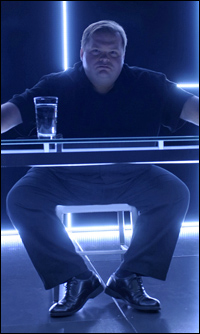
*
Mike Daisey found himself last month a monologist without a mic — between Jobs, literally: His sixth, and most successful, show at the Public Theater, The Agony and the Ecstasy of Steve Jobs, ended its extended, sold-out run on Dec. 4 but will resume for at least five more weeks of the same there on Jan. 31.
He and his director-wife, Jean-Michele Gregory, promptly vanished and just recently resurfaced on the shores of Mexico, living without electricity in a rustic hut. Their sole link to civilization was — thank you, Steve Jobs — an iPhone, and that's how this interview was done. Daisey quickly pooh-poohed the rumor he was down there messing with drug cartels for his next monologue. "No no no," he protested, "I'm just taking some time off, not getting into any trouble, trying not to generate any stories. Mostly, I'm trying to catch up on a lot of reading."
Given his laugh-laden, laser-like delivery, Daisey deserves this R&R in spades. "I am stressed a lot," he allows. "On the other hand, one of the interesting things about our culture is we always express stress as a negative — but of course, if one has no stress at all, I think that's actually death — so the process of being alive generates stress."
Daisey's push-pull diatribe on Jobs and the must-have technology that Jobs created, for better and for worse, bowed at the Public in a state of stress because of the death of the Apple king. "I found out maybe a minute after he passed, because I had a Google News Alert set for his name," he recalls. "I felt empty, very saddened because he meant so much to me. I'd been doing the piece a lot, so it was in the back of my mind this would happen. I figured, when the day comes, I'd adapt — although I will say, having it happen five days before my first performance in New York was intense.
| |
 |
|
| Mike Daisey | ||
| photo by Stan Barouh |
Twenty minutes after the news of Jobs' death broke, The New York Times e-mailed Daisey for an op-ed piece. It's the only writing he did on Jobs. He revised the show to include the death, but he didn't write it. "I don't write. I create extemporaneously on stage — in the air, as I'm talking to people. It's woven in front of people. It's like different ways of climbing up a mountain, so after you do it a long time, it sounds very chosen — and it is very chosen — but it's fundamentally oral."
This method earns Daisey a unique place in the hallowed halls of the Public. "It means he's the only writer who works here whose scripts I can't read and give him notes," explains the Public's artistic director, Oskar Eustis. "What I do is I get recordings. When he performs, he sends me the recordings, and I go running on the Brooklyn Bridge listening to the latest version of Steve Jobs, and then I call him up and give him notes on it. It's a completely unusual way of working, but he's worth it.
"This is, by far, the biggest audience response he has ever had — I mean, no comparisons. It's that weird thing when you close a show and the audience is still clamoring to get it. At that point, it's your job to try and find out how to satisfy them, so we're bringing the show back. It busted all our expectations and projections. Clearly, something is happening [in] this monologue that people are recognizing. It's something they want to hear, and he's the messenger they want to hear talk about it.
"I think there's a real hunger to understand that all of this electric stuff doesn't mean we're actually separated from the real world. There's something tremendously reassuring about finding out that this is built by people suffering under terrible labor conditions because it re-humanizes these objects. In a way, we like the idea we're cut-free and guilt-free, but in another way we know we actually need to be more connected to the rest of the planet. That's what I feel like the monologue does."
Daisey is happy for his extra five-plus weeks at the Public, but what he really wants is a gig on Broadway. And he'll make creative concessions so his show will appear more Broadway-friendly: "We're going to add dance numbers and cast them with Chinese laborers — actual dissidents or anyone who'll do it."











